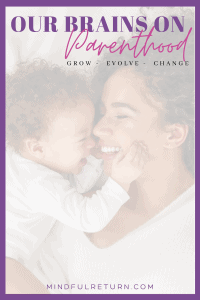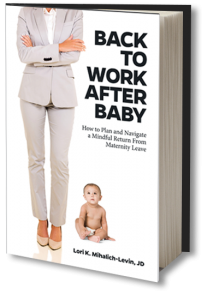Did you know that our brains are more plastic in the year after our babies are born, than any other time in our adult lives? I’m often on a soapbox about how parenthood grows our leadership muscles. And I’m both reassured and excited that there is neuroscience research that backs up this claim.
Today, I am thrilled to welcome Amy Henderson to the Mindful Return blog. She is an author, speaker, friend, and change-agent in the working-parent world. I was fortunate enough to read an advance copy of Amy’s new book, Tending: Parenthood and the Future of Work. And I’m here to tell you it is SO powerful. You can read more of my own reflections on her book here. I concluded my review with the following: “This masterful page-turner is a must-read for all humans, but especially for any parent who wants to feel seen and anyone who manages parents in the workplace.”
Today, I’m interviewing Amy about working parenthood. Her forthcoming new book. And her advice to all of us working parents who are struggling through this dark year of COVID. I also invite you to join me for a live conversation with Amy entitled “Parenthood’s Surprising Gifts: To Our Brains + Our Careers” on Tuesday, Feb. 23, from 1-2pm ET. Register here.
************************************
Mindful Return: Amy! I am so excited to have you here with us today. Please tell us a little about your working mother journey. What inspired you to be passionate about this topic?
Amy: When I accidentally got pregnant with my third child, I had three kids under the age of four. And I was working a more than full-time job. To say I was overwhelmed is an understatement. While out on parental leave, I started calling up the working moms I most admired to learn if it were possible to have kids and a successful career.
These conversations proved so revelatory that I kept going. I eventually left my job to interview hundreds of parents. I also dug into research from a broad range of relevant disciplines.
This quest revealed three things:
- It’s harder to be a working parent in the U.S. than in any other developed country in the world.
- There is an epidemic of shame among working parents.
- And yet, parenthood, possibly more than anything else, can neurologically prime us to develop skills that are critical for success in the modern workplace.
Mindful Return: You’ve taught me so much about how parenthood actually helps our brains *grow* in new ways. This is admittedly hard to imagine when we’re deep in the sleep-deprived fog of so-called “baby brain.” What would you like all new parents to know about neuroscience and parenthood? And why does this matter to our careers?
Amy: Our brains can change more during the year surrounding the birth of our child than at any other time in our adult lives. This is true for both moms and dads, regardless of whether the baby they are raising is their biological child.
As technology transforms our workplaces at increasingly exponential rates, the most important skills are those that only humans can develop. And these are the skills that parenthood neurologically primes us to learn.
However, the way our brains change during the year surrounding the birth of our child is dependent on our perceived level of support. Parents who feel as though they have the support they need are likely to develop enhanced capacities in five core areas. These are: emotional intelligence, courage, efficiency, productivity, and the capacity to collaborate. Parents who do not receive the support they need are more likely to increase their propensity for fear, aggression, and anxiety. These appear to last a lifetime.
Mindful Return: Congratulations on your forthcoming new book, Tending: Parenthood and the Future of Work. What’s the top message you hope readers of the book will take with them?
Amy: I hope my book is an ‘a-ha’ moment that allows parents, and anyone who reads the book, to put themselves into a bigger context.
I want parents to understand that they are not failing because of their unique and specific shortcoming. Or because of the bad decisions they’ve made. But rather, because they are part of a bigger system that does not support them or value the very real work of parenting.
Mindful Return: How can someone use your book to inspire change within the organization where they work?
Amy: American companies, with the exception of a few notable outliers like Patagonia, are not designed to meaningfully support working parents. And it is time for this to change.
In one of my chapters, I outline specific changes that we have found to be effective in building more parent-friendly workplaces. But even more importantly, digging into my book will help readers realize that there are many individuals and organizations who are working to change the game for working parents. Readers can connect to this greater movement to gain access to resources, communities, and leaders (like you, Lori!) to help them advocate for themselves inside their companies.
We are stronger together than we are alone.
Mindful Return: And now a personal question: When you get stuck in a state of “I can’t see the way out of this problem” despair (presuming you’ve felt this way), what lifts you up to a better state of mind?
Amy: I have definitely felt this way! COVID has made this an almost daily occurrence. All three of my kids are doing virtual learning for the full academic year. And it’s been beyond challenging.
What helps me the most is recognizing that I am not alone. And that I have the agency to do something. Not only in the small habits of my own life (like taking short breaks, eating better, exercising, etc.), but also in the bigger picture.
When I feel mired in a problem, it helps me to recognize that I can become a part of the solution. It resources me to take action to benefit not only myself, but the bigger picture, too.
Mindful Return: What book or books have inspired you on your working parent journey? Any podcasts you love?
Amy: I have been deeply inspired by both fiction and non-fiction. Here are some of my favorite non-fiction books:
- Overwhelmed: How to Work, Love & Play when No One has the Time, by Brigid Schulte
- Fair Play: A Game-Changing Solution for When You Have Too Much to Do (and More Life to Live), by Eve Rodsky
- Mother Nature: Maternal Instincts and How They Shape the Human Species, and Mothers and Others: The Evolutionary Origins of Mutual Understanding, by Sarah Blaffer-Hrdy
- The Uterus is a Feature, Not a Bug: The Working Woman’s Guide to Overthrowing the Patriarchy, by Sara Lacey
As for fiction, I loved Circe by Madeline Miller. (She chose a mortal life so she could marry and have a family.)
I need to start listening to more podcasts!
Mindful Return: What’s your #1 piece of advice for working parents?
Amy: Recognize that parenthood is forging you. Even, and especially, in the hardest moments. It is forcing you to grow and evolve in ways that possibly nothing else ever could.
 Amy Henderson is a leading voice on the critical role of parenting and caregiving in developing the future of work. Amy has three kids and is the founding CEO of TendLab. In this role, she has been working with companies and their parents groups at places like Salesforce, Accenture, Cloudflare, Airbnb, Lululemon, and many others to optimize the workplace for parents. Armed with the revelation that parenting develops career-critical skills, Amy wrote Tending: Parenthood & The Future of Work to claim the value of parents in the workplace.
Amy Henderson is a leading voice on the critical role of parenting and caregiving in developing the future of work. Amy has three kids and is the founding CEO of TendLab. In this role, she has been working with companies and their parents groups at places like Salesforce, Accenture, Cloudflare, Airbnb, Lululemon, and many others to optimize the workplace for parents. Armed with the revelation that parenting develops career-critical skills, Amy wrote Tending: Parenthood & The Future of Work to claim the value of parents in the workplace.
Want more practical tips on working parenthood? Check out my book, Back to Work After Baby: How to Plan and Navigate a Mindful Return from Maternity Leave



